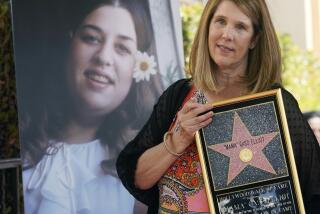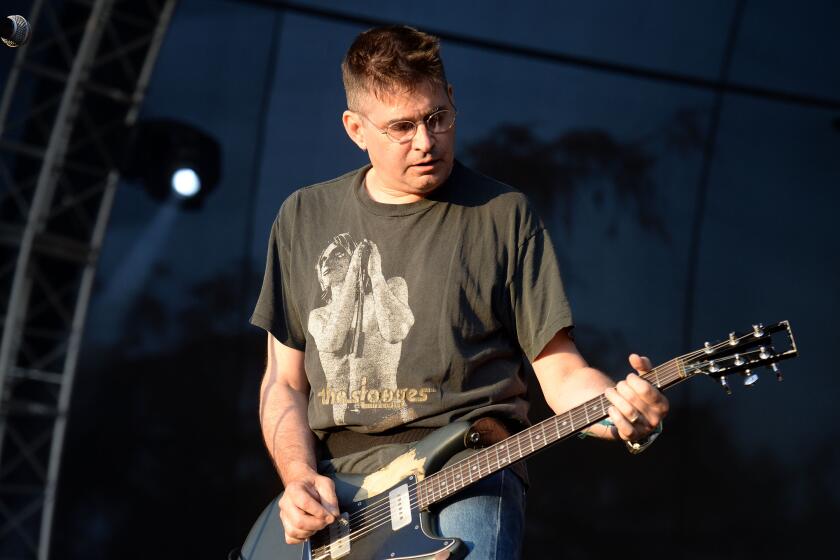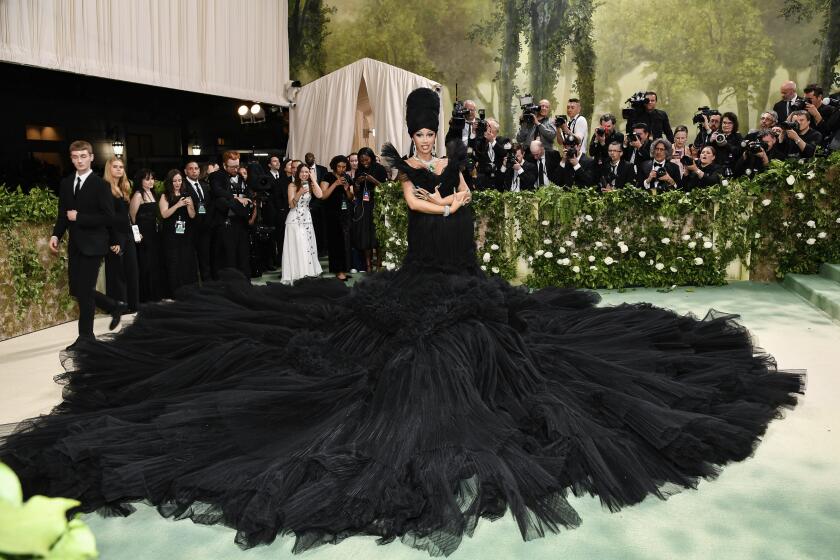‘The Bus May Be Different but It’s the Same Trip’ : Psychedelia: Singer Grace Slick comments on her life and a new, three-CD box from RCA Records, ‘Jefferson Airplane Loves You.’
When the truth is found to be lies
And all the joy within you dies
Don’t you want somebody to love?
--Jefferson Airplane, “Somebody to Love”
Her voice sounded like a hurricane rushing through a tunnel. There was a fury in Grace Slick’s singing, even though Jefferson Airplane loved everybody. Slick wore her attitude the way others of the psychedelic age wore a peace button.
“White Rabbit” made her rock’s reigning acid queen, and 25 years later, she’s retired from music.
Jefferson Airplane was formed by Marty Balin in 1965. It was the music of the love generation--the tangled flower-power, youth-and-drug, anti-Establishment cult that grew up around San Francisco’s Haight-Ashbury in the 1960s.
The original band started as folk rockers and included guitarist Paul Kantner, vocalist Signe Anderson, guitarist Jorma Kaukonen, bassist Jack Casady and drummer Skip Spence. After their first LP was released in 1966, Spencer Dryden replaced Spence and Slick replaced Anderson, who was pregnant.
As the dreamy smile of psychedelia darkened to the stark realities of death and violence, Jefferson Airplane grew more strident and political and stopped singing about love. The group soon fell apart.
Casady and Kaukonen left and formed their own group. Balin quit. Kantner and Slick continued making records with local musicians and eventually became Jefferson Starship. Balin returned and helped Starship put out the hit “Red Octopus” LP in 1975.
But the music of Jefferson Airplane isn’t lost. A new, three-CD box from RCA Records, “Jefferson Airplane Loves You,” pulls together 51 tracks of their music. It takes the band up to 1973, before its reorganization as Jefferson Starship.
Slick has become a vegetarian, eating no animal products; she studies medical books on the subject. She lives in Marin County, Calif., with her husband of almost 16 years, Skip Johnson, lighting director of Jefferson Starship when they met, now production manager for Prince.
She says her personality and tenacious espousal of altering certain existing conditions haven’t changed since the ‘60s. “The bus may be different but it’s the same trip.”
Here are highlights from a recent interview with Slick:
*
Question: A lot of tracks on “Jefferson Airplane Loves You” are marked “previously unreleased.” Why was it done that way?
Answer: I think it’s a combination of Bill Thompson, who was our manager, and RCA engineers, wanting to have weirdo cuts, which I like. I think it’s interesting. It is not all just perfect gems over the years, which is what most boxed sets are.
It is embarrassing sometimes for me. It is klutzy and I would prefer to sound better. But I like the idea they did that because it is real. That is who we were at the moment.
*
Q: Do you ever think what your life would have become if Signe Anderson hadn’t been pregnant and left so that Jefferson Airplane needed a replacement singer?
A: My life might have been different. At that point I was in Great Society. We had made records before Airplane did. Since I went over to the Airplane, Great Society didn’t exist anymore. I think I would have continued to do what I was doing, in one band or another.
*
Q: What were you doing before Great Society?
A: I was a floor model at I. Magnin. I’m 5 feet 7 but my legs weren’t long enough to be a big-time model. From the knees up, everything is long but from ankle to knee, if I was in proportion, I’d be 5 feet 9.
*
Q: Were your songs “White Rabbit” and “Somebody to Love” written for Great Society?
A: Yes, but “Somebody to Love” is by Darby Slick, my brother-in-law. He played guitar in Great Society. My husband, Jerry Slick, played drums. I wrote “White Rabbit.”
*
Q: How did you write songs?
A: Writing lyrics was the part I liked best. I would play piano to write and to show the band how a song went. I would write lyrics and arrange and rearrange them in all frameworks. If I wrote on marijuana, I would look at them the next day sober. Then I would look at them drunk. I’d take acid and rearrange it again. Then I’d look at it sober again. They were adjusted so on any level of consciousness . . . would be appropriate to me. Your strongest force and true self piled through the drugs anyway.
“White Rabbit” was mostly done in about two days, the music in about half an hour. The music is a “Bolero” rip-off and the lyrics a rearrangement of “Alice in Wonderland.” You take two spectacular hits and throw them together and it’s hard to miss. I probably wrote it on marijuana or wine, having had acid. I wasn’t taking acid at that point but I had had it so that influenced what I was writing.
The only song I wrote when I was taking no drugs at all and wasn’t even smoking cigarettes is “Panda,” in 1987, I think. I smoke now.
*
Q: Did you wear costumes in those flower-power days?
A: It wasn’t so much costumes. I wore the same thing during the day I did on stage. You get up in the morning and might put on knee-high pilot boots, a Girl Scout uniform, Indian headband. It was like going wild in a thrift shop, a mishmash. A lot of people had a character they liked. Pigpen (Grateful Dead keyboardist) looked like an 1800s Western outlaw. Janis (Joplin) looked like the head of a successful whorehouse. My outfits changed. It could be a political statement; whatever you felt like.
*
Q: Is there anything Jefferson Airplane could have done to keep from breaking up?
A: I don’t know if it wouldn’t have been a good idea to have more trying-to-pull-together meetings. We had meetings about business. I don’t know if it would have done any good. Jack (Casady) and Jorma (Kaukonen) were into blues. Paul was up-against-the-wall, topical, political. I was leftist, weird, dark and sarcastic. Marty was into love songs.
*
Q: Do you remember playing the Whitney Museum?
A: I remember it was the first time we had hand-held mikes not attached to a cord. I was ripping the audience before we even started. The band was going, “Oh, God.” Paul thought that was kind of fun. I enjoyed it. I was annoyed with upper-middle-class Episcopalians who paid $200 to see weird new art and then go back to their suburban homes.
I’d been there. My parents were Episcopalian Republicans. I went to Finch College. What they were doing was not learning. It was a night out to get dressed up and look at some freaks. I was taking advantage of that situation to pound them on that.
There was a bumper sticker, “Always Question Authority.” That’s an excellent idea. You don’t shoot them; you keep pounding at them.
I love my parents. They weren’t Nazis. They were programmed to be who they were. Our generation had the best public school education in the history of the world--and since. We had the choice of, “Do you want to live your parents’ life?” or “Do you want to follow Picasso who turned the whole art world up on its ear?”
*
Q: Have you changed?
A: Not a bit. The bus may be different but it’s the same trip.
*
Q: What did you think when Jefferson Starship succeeded Jefferson Airplane?
A: Starship was a whole different thing. It was pop rock. It made more money and had more hit songs than Airplane. There was no cultural or social ethic behind it. For me it was like selling out. I was the only one selling out. The rest enjoyed doing what they were doing.
*
Q: Is Jefferson Starship still flying?
A: There is a problem between Paul who has Jack Casady and members of his group as Jefferson Starship and Mickey Thomas and Starship. Paul made up that name. He’s the one with the spacey ideas, “Let’s all go to Mars.” What he’s doing now is more like Airplane than Starship. It’s topical. I’m not part of either one. I haven’t been for three years, since the Airplane toured in 1988-89.
*
Q: Why aren’t you singing anymore?
A: It’s like drinking, it’s not interesting enough. With all due respect to Mick Jagger, who is one of my idols, I think it’s a mistake to leap around and sing at 53. When I started, there weren’t any women I looked up to. It was Mick. I never saw anybody go on a stage and have that tongue-in-cheek attitude. It was all straight, including the Beatles. I love his attitude, hands on hips and lips out. It was, “We’re young and being silly and we know it. We know we’re having an out-of-line good time.”
*
Q: Could you still sing?
A: Since I never had an excellent voice, it’s the same as it has always been. I could do that. I don’t see any point in it. The kind of stuff I write about would not sell.
More to Read
The biggest entertainment stories
Get our big stories about Hollywood, film, television, music, arts, culture and more right in your inbox as soon as they publish.
You may occasionally receive promotional content from the Los Angeles Times.






